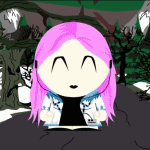A while ago - okay, a long while ago - I
wrote post about the first
two novels about Penelope Akk, “Please don’t tell my parents I’m a
supervillain” and “Please don’t tell my parents I blew up the moon.” Yesterday, I bought and read the third one,
“Please don’t tell my parents I’ve got henchmen.”
After successfully - if not willingly -
establishing herself as a villain and blowing up a Jupiter moon to save mankind
(without mankind actually knowing), Penny Akk could take it more slowly, but
she still wants to be a hero. Her first try at that, however, ends in a very
strict sentence from her parents: she is not allowed to fight anyone who might
challenge her, unless she wants her allowance to be withheld for a week and no
computer or phone access for the rest of the day. Little do Barbara and Brian
Akk know, of course, that her daughter has thousands of dollars in a secret
bank account (villainy does pay, it seems) - which she can’t spend in her
civilian life.
Around Penny, a lot of other children of
heroes and villains are fed up with pretending to be normal. And the club Penny
originally only founded so she and her friends could use the old lab beneath
their school as their lair is a way out. Suddenly, it grows and Penny becomes
the reluctant club leader. While Penny Akk can’t take part in fights now, Bad
Penny and her team have to find a new lair - which happens to be across the
street. Things get difficult around Penny, as puberty doesn’t only set in for
her, but also for a lot of the other children. But Penny also proves herself a
very good leader of the club in times of crisis, may it be to save a few of the
group from Mourning Dove or provide guidance during a sudden rise of zombie
robots. And all without fighting as Penny Akk, even though Bad Penny has to do
some of that.
The third instalment of the series has made
me curious again. I didn’t like the second one as much as the first and thought
the series might run itself dry, but “Please don’t tell my parents I’ve got
henchmen” is a nice sequel to the first two books. Things change, that is a
major plot point in the book.
Ray, who started the team on the villainous
path when he tried to trash the science fair and who always liked the crimes
most, is weaning off them.
Marcia, who always set herself up as the
righteous hero, is going for villainy all in a sudden. Or rather, she’s going
for fights, testing her new ability to heal from everything to the limits.
Claire wants to turn into a cat-burglar,
which would afford her a single career.
Claudia, whose strength and near
indestructibility made her a dangerous adversary for the Inscrutable Machine, gets
closer to her father again and starts to realize she doesn’t have to save
everyone, if she doesn’t want to.
Penny has to deal with a lot of changes
throughout the school year, starting the moment she decides to show off her
powers when a football player decides to show off his at a game.
The school itself changes as well, when the
children with superpowers stop hiding them. Because of the early intervention
of Barbara Akk and some colleagues from the hero side, though, the worst
excesses get curbed even before they could become a problem.
With Bull, just retired supervillain,
overlooking the club meetings and sparring matches, nothing too serious
happens. It also affords him time to spend with his daughter Claudia. Yet the
students can hone their powers, even those who don’t want to fight (but, in the
cases of Jacky and Barbara [not Mrs. Akk], make excellent healers).
The balance in school changes dramatically
with Marcia no longer being the popular cheerleader, changing her style
completely to fit with her new outlook on life. After all, she puts her own
father into hospital during her first rebellious act.
By the end of the year, Penny has changed
as much as everyone else, to a certain degree merging the confidence of Bad
Penny with the uncertainty of Penny Akk. And she finds a strange offer thrust
at her - to become Spider’s apprentice once she turns eighteen.
Again, the book is meant for teenagers and young adults, but
it’s a very entertaining read for other people as well … if you love
superheroes and supervillains.




